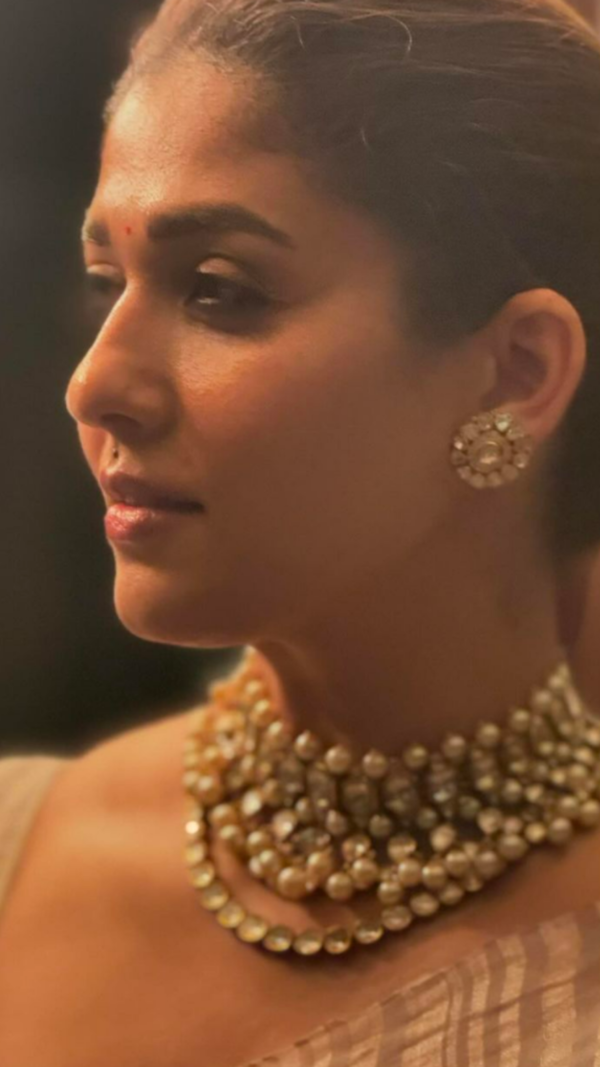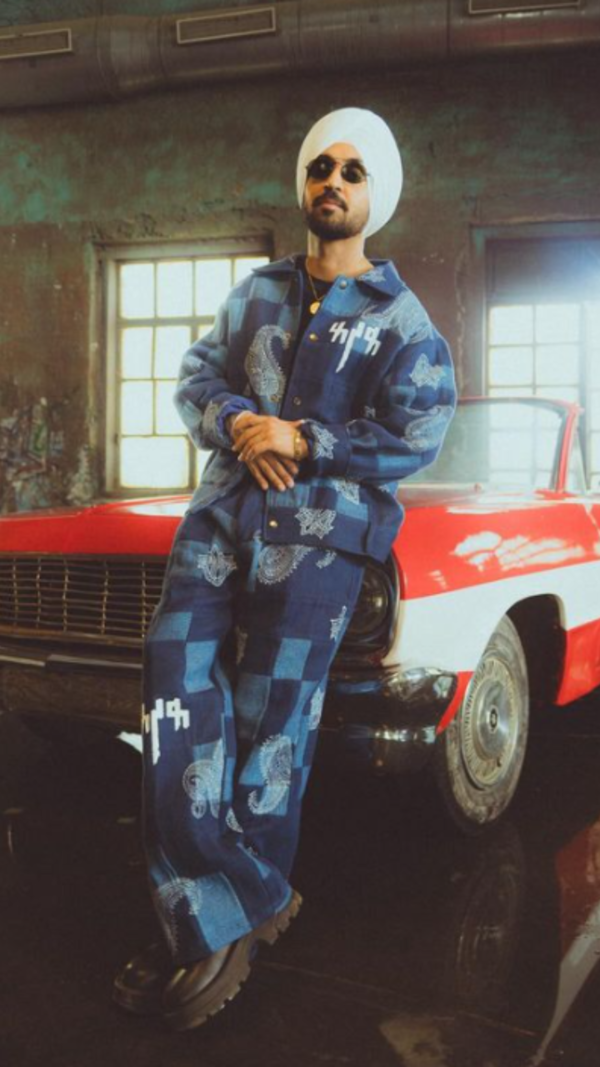- News
- entertainment
- marathi
- movies
- Sonalee Kulkarni: Regional actors are breaking barriers and working in various languages- Exclusive!
Trending
Sonalee Kulkarni: Regional actors are breaking barriers and working in various languages- Exclusive!
In an exclusive chat with ETimes, Sonalee expresses her gratitude for the positive response received for 'Malaikottai Vaaliban' and her experience working with Mohanlal and more.

Marathi Cinema's 'Apsara' Sonalee Kulkarni, who is well known for her stellar performances in films like 'Hirkani', 'Pandu, 'Natarang', Phoster Girl', and others, recently made her debut in Malayalam cinema with Mohanlal starrer 'Malaikottai Vaaliban'. In an exclusive chat with ETimes, Sonalee expresses her gratitude for the positive response received for 'Malaikottai Vaaliban' and her experience working with Mohanlal and more.
Excerpts...
How this role happened to you?
I received a call from the casting team while shooting for "Mughalmardini Chhatrapati Tararani," my upcoming Marathi film. Initially, I was surprised that a Malayalam film with Mohanlal Sir and Lijo Jose Pellissery would be interested in casting me. The authenticity of the offer was confirmed through multiple calls, including one from Siddharth Menon, a friend and actor from the Marathi industry. After going through the synopsis and meeting the producers, I felt the gravity of the situation. It's indeed overwhelming to be part of such a colossal project, featuring one of the biggest names in Malayalam cinema and a renowned director.
In this fantasy drama set in an unspecified period, I play Rangapattinam Rangarani, a vibrant and dramatic performer travelling with a troop. Lijo wanted to blend elements from various Indian folk cultures, creating a unique look. My character interacts playfully with Mohanlal's protagonist, Valivaan. The biggest challenge was learning Malayalam, a language I hadn't worked with before. We had workshops and on-set language coaching to ensure correct pronunciation and expression. The character's look is a fusion of Marathi, Rajasthani, and South Indian influences, adding a colourful touch to the film.
How interesting and enriching was working with Mohanlal? any anecdotes you would like to share?
Collaborating with Mohan Lal Sir was an immersion into the realm of cinematic brilliance and unparalleled dedication. From the very first encounter on the sets in Jaisalmer, his warm welcome set the tone for an extraordinary journey. During his action sequence shoot, amidst the cold desert winds, his immediate concern for my comfort epitomised his generosity and camaraderie. It was during this shoot that I witnessed firsthand his commitment to perfection in every action sequence, a testament to his enduring passion for his craft. He not only recognized my work but also expressed genuine curiosity about the nuances of my recent popular songs. His childlike enthusiasm for discussing his favourite action sequences from 'Lucifer' or demonstrating dance steps between takes was both delightful and enlightening. It's not every day that a legendary actor, with a plethora of accolades and accomplishments, exhibits such humility and genuine interest in others' work.

Did you feel nervous like many regional actors do when trying to succeed in other language industries?
It's a topic we touched upon earlier, and yes, regional actors often find it challenging to make their mark in different language industries or pan-India films. Personally, I wasn't sceptical or nervous, but rather cautious about stepping out of the Marathi film industry. For me, it's not just about who the protagonist is; it's about what value I bring to the project. As an actor, I want to uphold the love and respect I've received from my home industry. If a project aligns with that expectation, there's no nervous energy. Balancing this struggle is something regional actors face, but I'm not desperate to take on projects that don't resonate with my values and the audience's expectations. It's a fantastic time for Indian cinema post-COVID, with regional actors breaking barriers and working in various languages. So, I see it as a positive, embracing the best times in the Indian film industry, regardless of the region.

You have been part of the Marathi film industry for a long time. Do you think Marathi filmmakers are still finding it challenging to produce large-scale films?
In recent years, there's been a positive shift in how Indian filmmakers view regional cinema. Marathi films, known for their rich content, have earned nationwide respect. Local filmmakers are now stepping beyond Marathi boundaries, venturing into pan-Indian and Hindi films. Names like Aditya Sarpotdar, Sameer Vidwans, and Ravi Jadhav are making their mark, with Aditya even directing Hindi films with Maddock. Filmmakers like Nikhil Mahajan, a national award winner, and actors like Amruta Subhash, Sai Tamhankar, and Amay Wagh are actively participating in pan-India projects. Marathi filmmakers are breaking barriers, bringing their content expertise to a larger scale. Names like Laxman Uttekar, a Maharashtrian technician turned filmmaker, are contributing to this shift, working on large-scale projects with renowned actors like Vicky Kaushal. It's a far cry from the days when Marathi filmmakers were confined to a certain scale.
Tell us about your upcoming projects.
One of my most anticipated projects is "Mughalmardini Chhatrapati Tararani," a Marathi historical drama releasing on March 22. The film narrates the story of a Maratha warrior queen who bravely fought against Aurangzeb for seven years. It's a tale of resilience and victory against all odds, highlighting the strength of an unsung hero. Another exciting project is "Rao Saheb," an ensemble-cast film directed by Nikhil Mahajan, a recent Golden Lotus national award winner. Set in contemporary times, the film explores the conflicts in Chandrapur, Nagpur, touching upon human-animal conflicts and issues related to coal mines. I portray a character with a unique look, offering a fresh challenge and experience.
This year holds special significance for me, as I've had the privilege of working with two exceptional directors. Lijo Jose Pellissery, who directed "Mallaikottai Valliban," and Nikhil Mahajan, the visionary behind "Rao Saheb," were both Silver Peacock Award winners at IFFI. It's truly a fantastic time to collaborate with such creative minds. In a nutshell, 2024 promises to be a year filled with diverse and exciting projects, offering audiences a glimpse into untold stories and unexplored characters.
Excerpts...
How this role happened to you?
I received a call from the casting team while shooting for "Mughalmardini Chhatrapati Tararani," my upcoming Marathi film. Initially, I was surprised that a Malayalam film with Mohanlal Sir and Lijo Jose Pellissery would be interested in casting me. The authenticity of the offer was confirmed through multiple calls, including one from Siddharth Menon, a friend and actor from the Marathi industry. After going through the synopsis and meeting the producers, I felt the gravity of the situation. It's indeed overwhelming to be part of such a colossal project, featuring one of the biggest names in Malayalam cinema and a renowned director.
You made your acting debut in Malayalam films with this movie, how was the experience?
In this fantasy drama set in an unspecified period, I play Rangapattinam Rangarani, a vibrant and dramatic performer travelling with a troop. Lijo wanted to blend elements from various Indian folk cultures, creating a unique look. My character interacts playfully with Mohanlal's protagonist, Valivaan. The biggest challenge was learning Malayalam, a language I hadn't worked with before. We had workshops and on-set language coaching to ensure correct pronunciation and expression. The character's look is a fusion of Marathi, Rajasthani, and South Indian influences, adding a colourful touch to the film.
How interesting and enriching was working with Mohanlal? any anecdotes you would like to share?
Collaborating with Mohan Lal Sir was an immersion into the realm of cinematic brilliance and unparalleled dedication. From the very first encounter on the sets in Jaisalmer, his warm welcome set the tone for an extraordinary journey. During his action sequence shoot, amidst the cold desert winds, his immediate concern for my comfort epitomised his generosity and camaraderie. It was during this shoot that I witnessed firsthand his commitment to perfection in every action sequence, a testament to his enduring passion for his craft. He not only recognized my work but also expressed genuine curiosity about the nuances of my recent popular songs. His childlike enthusiasm for discussing his favourite action sequences from 'Lucifer' or demonstrating dance steps between takes was both delightful and enlightening. It's not every day that a legendary actor, with a plethora of accolades and accomplishments, exhibits such humility and genuine interest in others' work.

Did you feel nervous like many regional actors do when trying to succeed in other language industries?
It's a topic we touched upon earlier, and yes, regional actors often find it challenging to make their mark in different language industries or pan-India films. Personally, I wasn't sceptical or nervous, but rather cautious about stepping out of the Marathi film industry. For me, it's not just about who the protagonist is; it's about what value I bring to the project. As an actor, I want to uphold the love and respect I've received from my home industry. If a project aligns with that expectation, there's no nervous energy. Balancing this struggle is something regional actors face, but I'm not desperate to take on projects that don't resonate with my values and the audience's expectations. It's a fantastic time for Indian cinema post-COVID, with regional actors breaking barriers and working in various languages. So, I see it as a positive, embracing the best times in the Indian film industry, regardless of the region.

You have been part of the Marathi film industry for a long time. Do you think Marathi filmmakers are still finding it challenging to produce large-scale films?
In recent years, there's been a positive shift in how Indian filmmakers view regional cinema. Marathi films, known for their rich content, have earned nationwide respect. Local filmmakers are now stepping beyond Marathi boundaries, venturing into pan-Indian and Hindi films. Names like Aditya Sarpotdar, Sameer Vidwans, and Ravi Jadhav are making their mark, with Aditya even directing Hindi films with Maddock. Filmmakers like Nikhil Mahajan, a national award winner, and actors like Amruta Subhash, Sai Tamhankar, and Amay Wagh are actively participating in pan-India projects. Marathi filmmakers are breaking barriers, bringing their content expertise to a larger scale. Names like Laxman Uttekar, a Maharashtrian technician turned filmmaker, are contributing to this shift, working on large-scale projects with renowned actors like Vicky Kaushal. It's a far cry from the days when Marathi filmmakers were confined to a certain scale.
Tell us about your upcoming projects.
One of my most anticipated projects is "Mughalmardini Chhatrapati Tararani," a Marathi historical drama releasing on March 22. The film narrates the story of a Maratha warrior queen who bravely fought against Aurangzeb for seven years. It's a tale of resilience and victory against all odds, highlighting the strength of an unsung hero. Another exciting project is "Rao Saheb," an ensemble-cast film directed by Nikhil Mahajan, a recent Golden Lotus national award winner. Set in contemporary times, the film explores the conflicts in Chandrapur, Nagpur, touching upon human-animal conflicts and issues related to coal mines. I portray a character with a unique look, offering a fresh challenge and experience.
This year holds special significance for me, as I've had the privilege of working with two exceptional directors. Lijo Jose Pellissery, who directed "Mallaikottai Valliban," and Nikhil Mahajan, the visionary behind "Rao Saheb," were both Silver Peacock Award winners at IFFI. It's truly a fantastic time to collaborate with such creative minds. In a nutshell, 2024 promises to be a year filled with diverse and exciting projects, offering audiences a glimpse into untold stories and unexplored characters.
Malaikottai Vaaliban | Song - Madabhare Naina (Lyrical)
End of Article
FOLLOW US ON SOCIAL MEDIA








